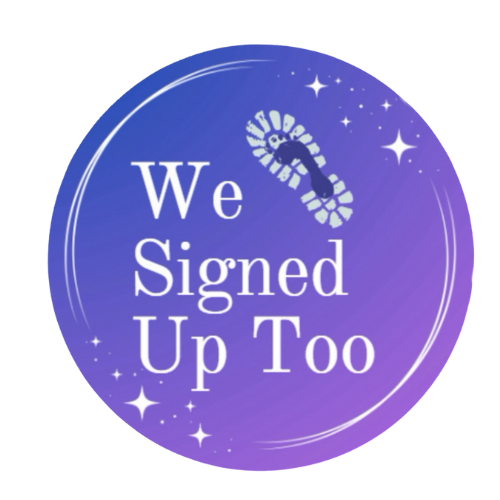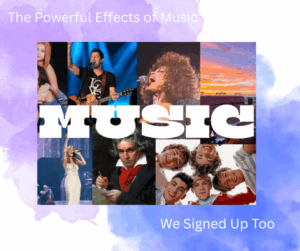

Bringing Community and Awareness to Children of Wounded, Ill and Injured Veterans

If your answer is yes, you are not alone. It is amazing how many people (who aren’t even emotional by nature) can be inexplicably moved to tears by a song. Even weirder? It may be that while one individual is weeping from hearing the tones of Someone Like You over a loudspeaker, another can stand there completely unfazed. Coincidence? I think not. Music plays a large part in our everyday life. You can’t even make it through the mall without hearing a popular song playing over the speakers. With all this constant exposure, it’s no wonder that the general population (especially kids our age) love listening to music. So much so, that we begin to formulate our own preferences and opinions on it. Sometimes to the point where we can even begin defending a certain genre or artist. This is a frequent debate between my sister and I.
It is undeniable, music has an influence on our lives, whether we want it to or not. That is why I decided to focus this second article in my series on coping skills with another form of art that greatly impacts our lives; music.
Let me preface this article by saying, I LOVE music. I don’t mean, I listen to it here and there. No! This is coming from a person who wants to start her own collection of vinyl, is currently saving up for a record player, and has a list of all the artists she wants to see in concert before they stop touring. Yes, I know there are more die-hard music fanatics than me, but what I am trying to say is that I take the content of this article seriously. I want to do justice to the amazing healing powers of music while also bringing attention to the possible pitfalls that can come with music, if we are not careful.
Music and its Positive Effects
Have you ever had a music jam session alone in your room? We’re talking the turned up to max volume, screaming along with the lyrics and dancing like no one is watching kind of experience. If you have not done this, I highly suggest you try it out. If you have, chances are after this exhilarating event, that you felt even more energized yet relaxed than you did before your musical worthy moment. This feeling isn’t some unexplained phenomenon that only happens to a chosen few. Instead, it’s something that even science has been able to prove. It is music’s superpower; the ability to ease any anxiety, stress or tension we may have and replace it with a light, airy feel that can turn a bad mood around completely.
You see, when we listen to music our brain releases neurochemicals like dopamine (a chemical that releases feelings of pleasure and reward) and oxytocin (the chemical that helps us in connecting with others). Music can also play a crucial part in our memories. That is why when a nostalgic song comes on, we usually respond emotionally. Of course, research continues when it comes to discoveries like this, but the breakthroughs made concerning the effects of music have had an overwhelming success rate when it comes to helping individuals.
There are now forms of music therapy that have been shown to help patients recovering from strokes and those suffering from anxiety and depression. So, the urge to queue up your perfectly made Spotify playlist after an especially stressful day at school or in response to stressful events at home is a normal response to the ease music can bring. That is why I thought this was the perfect topic for this series. As kids and teens dealing with the amount of stress and responsibilities thrown at us because of the struggles our injured veteran parent/s endure, it is crucial that we build a sort of coping “toolbox” with healthy coping strategies that we can easily pull out when the need for one arises.
Music and Its Potential Negative Effects
As with practically everything else in life, music is not one-sided. With its potential to heal and aid stress and relieve symptoms of anxiety, it can also be the cause of depression, rumination (repetitive thoughts of negative past or present events) and desensitization. This chart provided on an article about music by the National Library of Medicine gives a stellar visual of the pros and cons of music:
*if you would like to learn more about this diagram you can read the article written by the NLM here
We have already discussed what is displayed on the left-hand side of the diagram, but I want to focus on what is displayed on the right side for this section.
As you saw from the first part of this article, music is not only a fun pastime and hobby, but it also has amazing health benefits. The difference is in the way it is used and the discretion practiced when choosing what to listen to. Music resonates in our brains and bodies. As I explained in more detail above, just listening to music releases neurochemicals. The only catch is that it doesn’t always release dopamine and oxytocin.
In 2022 a research was held studying the eight musical emotion mechanisms highlighted in the brain (see the link for more info below). What researchers found when studying young adults was that there were higher levels of sadness, rumination and depression in young people who continuously listened to “sad” songs. The worst part? Many of the youths who displayed rumination and depression would sometimes intentionally choose songs that could induce their symptoms and make it worse, leaving them in an endless repetitive cycle.
In addition to inducing these symptoms, listening to music can also slowly desensitize individuals. More times than not, you could be listening to something that you wouldn’t even watch on TV. Because of this it is imperative to take the time to assess what you are taking in from music, as the last point shows, it affects not only your mood but your brain.
Conclusion
As I mentioned in the beginning, this article comes from a very special place for me. I myself have found healing from music during hard times, but I also realize the slippery slope that exists concerning music. Whatever your thoughts are on this healing and impactful form of art, I hope this article gave helpful insight into the pros and cons of music and will continue to be of use as you continue to explore the different genres that exist while also wisely choosing what you listen to.
POSTED BY: SINAIYAH EMAMI
IN: ARTICLES
SOURCES
Chen, L. (2023, August 3). Influence of music on the hearing and mental health of adolescents and countermeasures. Frontiers in neuroscience. https://pmc.ncbi.nlm.nih.gov/articles/PMC10434992/
Eck, A. (2025, March 14). How music resonates in the brain. Harvard Medicine Magazine. https://magazine.hms.harvard.edu/articles/how-music-resonates-brain
Roger, B. (2023, April 12) The Harmful Side of Music: Understanding the Effects of Rumination on Adolescent Mental Health. Manning Family Children’s. https://www.manningchildrens.org/news-blog/2023/april/the-harmful-side-of-music-understanding-the-effe/
Stanborough, R. (2020, April 1) The Benefits of Listening to Music. Healthline. https://www.healthline.com/health/benefits-of-music
Santos-Longhurst, A. (2020, January 28) The Uses and Benefits of Music Therapy. Healthline. https://www.healthline.com/health/sound-healing
This is so true! I used to listen to this piece of classical music whenever I went to bed and now it really calms me down whenever I’m upset or scared. There’s also some songs from tv shows I like that always make me want to cry.
That’s amazing! Yes, for sure. I usually find that especially when it comes to songs from movies or TV shows they make me feel really sentimental. I am so glad you enjoyed the article!